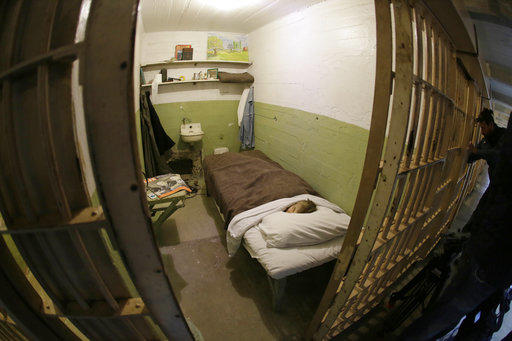Section Branding
Header Content
Audit: In Georgia, Private Prisons Cost More Than State-Run Prisons
Primary Content
A new audit says it costs Georgia more to keep inmates in privately run prisons than in those run by the state.
State prisons cost about $44.56 per inmate per day, compared to $49.07 for similar inmates in private prisons, according to the audit.
That may not account for costs such as pensions for state prison workers, the head of the state House Appropriations Committee told the Atlanta Journal-Constitution.
Rep. Terry England, R-Auburn, said he wants to dig into the numbers more before deciding whether it makes more sense to expand state prisons or spend more on private prisons.
England said his committee requested the audit to see whether criminal justice changes affected long-term projections for Georgia's prison population.
The audit found that prison population growth has slowed, but is still expected to rise by nearly 1,280 inmates over the next five years.
"Had we not been doing criminal justice reform, that 1,200 number would probably be 7,500 or so," England said.
When Gov. Nathan Deal took office in 2011, 1 in 13 Georgians was locked up, on probation or on parole -- the nation's highest such figure -- and faced the likelihood of needing $264 million to build two new prisons if nothing changed.
Georgia changed some nonviolent felonies to misdemeanors. For example, the threshold for felony shoplifting was raised from $500 to $1,500 in stolen goods. They also created new categories of punishment for drug possession, with less severe penalties for offenders found with small quantities.
The changes kept hundreds of nonviolent offenders out of prison.
The governor also greatly expanded accountability courts in Georgia that take in drug addicts, the mentally ill, veterans and juveniles who've committed nonviolent offenses. A state study said that recidivism rates for graduates of accountability courts are about 10 to 15 percentage points lower than those of similarly situated defendants who did not participate.
Including medical and maximum-security units, the state spends an average of $65.58 a day on each inmate. The audit said the lower figures are based on comparisons that control for an offender's sex, facility size and risk classification.
The state's prison budget is about $1.2 billion a year, about what it was when Deal took office. In fiscal 2018, which ended June 30, the Georgia Department of Corrections averaged just over 50,000 inmates a day, including those in private prisons and county jails.
Two private prison companies -- Florida-based GEO Group and Nashville, Tenn.-based CoreCivic -- get nearly $140 million a year to house 15 percent of the inmates. The four private prisons the state uses averaged about 7,800 inmates in medium-security facilities, according to the state.
The payment is about double the amount spent on private prisons 12 years ago.
GEO Group released a statement saying spending to improve inmate rehabilitation wasn't counted.
"We believe our cost would be lower if the auditors had compared all of the services and programs we offer at the Riverbend Correctional Facility," it said.
CoreCivic spokesman Rodney E. King, said its contract gives Georgia the flexibility to adjust inmate populations while keeping costs set over a given time period.
___
Information from: The Atlanta Journal-Constitution

